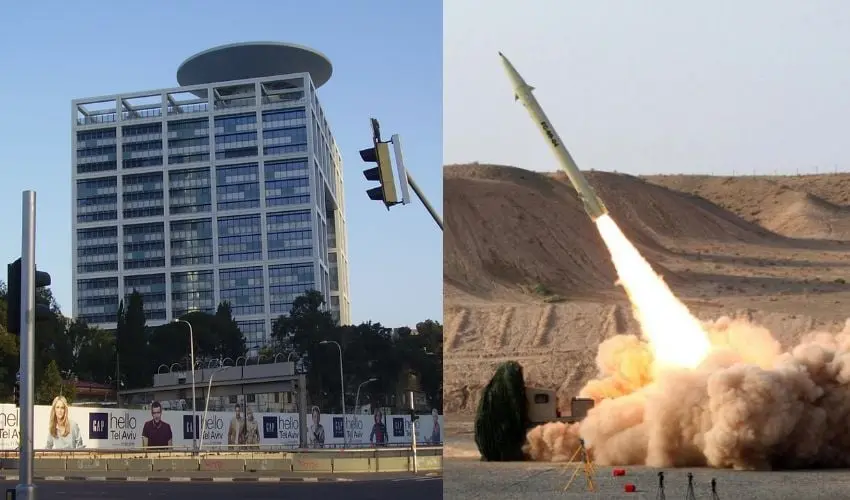
Iranian state channel SNN (Student News Network) released on Tuesday, 17, that Iran performed attacks against Israeli intelligence facilities located in Herzliya, a city north of Tel Aviv. The operation would target Operational Centers of Mossad, Israel’s Foreign Intelligence Agency. The information was reproduced by the Russian Sputnik Brazil agency and circulated on Iranian social networks.
According to the broadcaster, the attacks were launched in response to Israel’s recent military actions against Iran’s linked targets. SNN has classified the shots as “accurate and surgical” and claimed that the missiles hit “the nevalgic centers of Zionist intelligence.”
The city of Herzliya, located in the Metropolitan Region of Tel Aviv, is pointed out by international vehicles as the headquarters of Mossad Strategic Units. For this reason, it is considered a sensitive area for the Israeli security apparatus. The alleged attack marks an intensification of the confrontation between the two countries in a moment of military climbing in the region.
To date, there has been no official confirmation from the Israeli government about the occurrence. Nor were reports on damage, victims or the type of weaponry allegedly used. On the Iranian side, the information was limited to the SNN channel statements. No official organ in Tehran has detailed the range or effects of the offensive.
The Sputnik Brasil agency pointed out that if the targets were hit as announced, the operation would represent an advance in the pattern of military actions adopted by Tehran. This would include the direction of attacks on Israeli intelligence structures, with the potential to cause expanded reaction by the government of Benjamin Netanyahu.
The report of the Iranian broadcaster arises amid the intensification of the regional confrontation. In recent days, Israel has intensified attacks on areas linked to Iranian interests, including operations in countries such as Syria and Lebanon. Israeli authorities have reiterated that maintain actions aimed at preventing the strengthening of Iran in zones of influence near Israeli territory.
The supposed retaliation in Herzliya expands the possibility of a new phase of the conflict, marked by actions with targets of high strategic value. The absence of official confirmation by Israel is interpreted by analysts as part of a cautious government posture in the face of the nature of the attack and its potential regional and international impact.
The reported offensive occurs in a context in which Israel and Iran are already facing indirect actions, such as attacks on military positions, logistics facilities and weapons systems. The opening of a new front focused specifically to intelligence agencies would mark a change in the scope of the confrontation.
Herzliya houses structures considered vital to Israel’s national security, including Mossad’s planning and command offices. A direct attack on the city would have significant implications from both an operational and symbolic point of view. So far, however, concrete images or evidence of the offensive have not been presented by the Iranian sources.
The reported attack happens in parallel to a deteriorated diplomatic scenario. The dialogue channels between the two countries are inactive and there is no evidence of resuming those mediated by third parties. Military climbing occurs while western governments are concerned with concern to increase tension and the risk of conflict propagation to other Middle East territories.
International organizations monitor the situation, but have not yet issued announcements about the episode. The global intelligence community is also awaiting further clarification to evaluate the extent of damage and the possible involvement of other powers in containing the crisis.
Until the closure of this report, Prime Minister Benjamin Netanyahu’s office had not made pronouncements about the alleged attack. The Ministry of Defense of Israel and the state-of-the-office of the Defense Forces did not speak either.
The absence of confirmation may indicate internal evaluation in progress or the decision to avoid feeding the climb, at least in the short term. Experts note that in similar cases the Israeli government adopts strategic silence until intelligence information.
The international repercussion of SNN’s complaint and reflected by Sputnik Brazil is expected to press Israeli authorities to position themselves in the coming days. The eventual confirmation of the attack on the Mossad headquarters would open a precedent in terms of direct confrontations between the two countries.
Meanwhile, the regional scenario remains unstable, with prospects for new episodes of retaliation. The conflict between Israel and Iran, historically locked through intermediaries and covered operations, may be entering a more open confrontation phase, with direct impacts on international security.
Source: https://www.ocafezinho.com/2025/06/17/ira-afirma-ter-atacado-sede-do-mossad-em-cidade-estrategica-de-israel/

